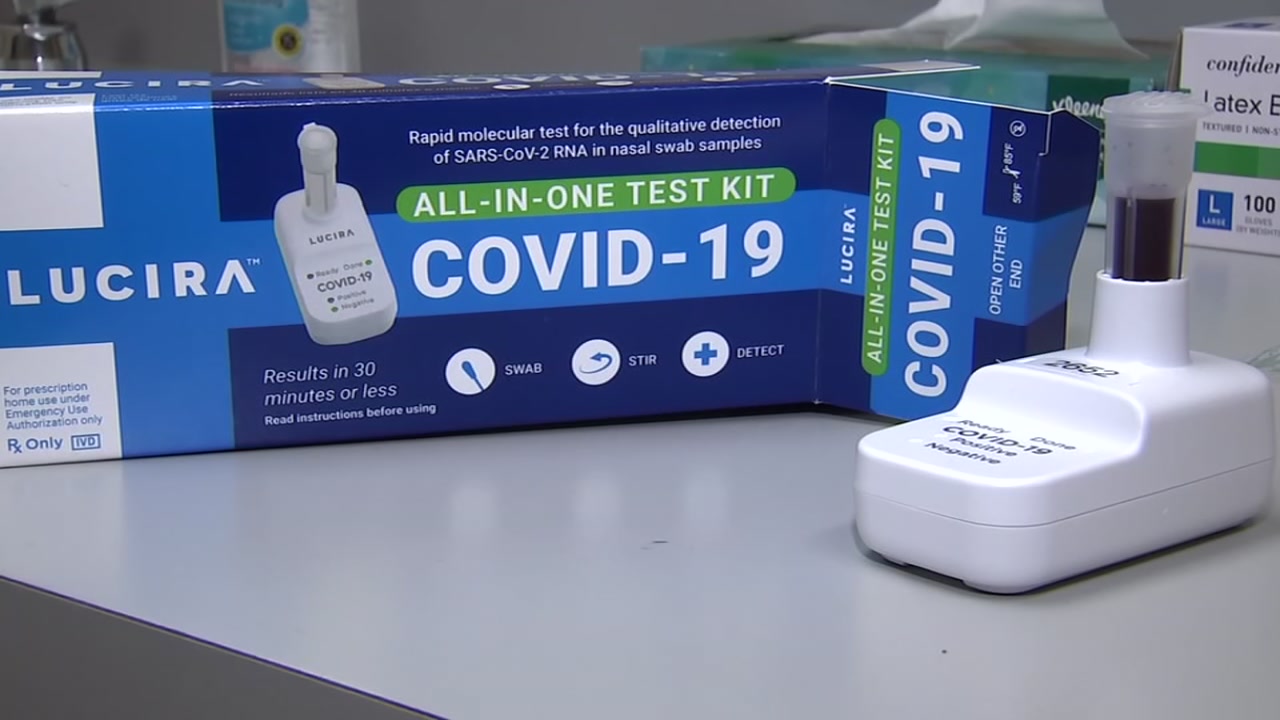Bay Area researchers develop new rapid COVID-19 test that uses smartphone camera
SAN FRANCISCO (KGO) -- Bay Area researchers believe a new device has the potential to ramp up the fight against COVID-19. It's designed to diagnose the virus in a fraction of the time, with the help of something you may have in your pocket.
In a lab at the University of California, researchers are working with a device that can both detect the virus quickly and also indicate how much is present. All it takes is a marriage of Nobel Prize-winning science and consumer electronics, namely, a cellphone.
"And it turns out the phone cameras, which have been getting better and better over time are just as capable if not better than laboratory instruments," says Bioengineer Dan Fletcher, Ph.D.
RELATED: MIT working to launch app that uses AI to detect COVID-19 in coughing sound
We first me Dr. Fletcher at his Berkeley lab roughly a decade ago, when he was pioneering the use of cellphone cameras to spot and diagnose diseases around the world. But in the case of COVID-19, he says the key is having a test result the phone can see.
"That allows us to have that molecular recognition. And then turn it into a florescent signal that the phone camera is sensitive enough to pick up," he explains.
Enter Melanie Ott, M.D., Ph.D. and Parinaz Fozouni virology researchers at San Francisco's Gladstone Institutes. Gladstone has been at the center of the gene editing revolution, which was accelerated by a technology known as CRISPR.
"You know CRISPR was discovered in 2012 as something we could use for genome editing, and now there are very few labs in the world that haven't used it in some application," says Fozouni.
In this application, the Gladstone team added a CRISPR protein that would react to the RNA, or genetic material in the COVID-19 virus. If it's present the protein triggers a second reporter molecule to emit a florescent signal.
Back at the Fletcher lab, the Gladstone test is being coupled with a cell phone camera, that can detect the florescent glow.
RELATED: Coronavirus results in 11 minutes? Here's how Bay Area-based Lucira's new at-home test kit works

"And now we're seeing the SARS COVID-2 line is glowing, indicating this is a positive test," explains researcher Sungmin Son, pointing to a glowing green vertical line that represents the COVID sample.
The test took about 30 minutes, but researchers say heavier viral loads have been detected even faster. Gladstone's Melanie Ott says the goal is to have a test that can be used quickly, with normal swabs, in real world settings.
"That means police departments, doctors' offices, an airport, school, an employer, where this device could be used before people enter," explains Dr. Ott.
And while there is still testing to be done, researchers are excited about the potential impact a quick and accurate test could have, in beating back the pandemic.
Late last year, another member of the Gladstone and Berkeley team, Jennifer Doudna, shared in a Nobel Prize in Chemistry, for her part in developing the CRISPR gene editing technology.
If you have a question or comment about the coronavirus pandemic, submit yours via the form below or here.
Get the latest news, information and videos about the novel coronavirus pandemic here
RELATED STORIES & VIDEOS:
- From COVID-19 to Black Lives Matter, these 13 people defined the Bay Area in 2020
- Map: CA counties that can, can't reopen under new rules
- CALCULATOR: Find out how many people may get a COVID-19 vaccine before you
- VIDEO: When will I get the COVID-19 vaccine? We explain who goes 1st
- COVID-19 risk calculator: The safest and most dangerous things to do this holiday season
- Want to get a COVID-19 test in time for the holidays? Here's what you need to know
- Updated number of COVID-19 deaths, cases in Bay Area
- Map shows everywhere you can get a COVID-19 test in the Bay Area
- COVID-19 Diaries: Personal stories of Bay Area residents during pandemic
- California EDD: The most commonly asked questions we get about unemployment and PUA
- Health experts urge flu shots in effort to avoid 'twindemic'
- How to tell the difference between seasonal allergies and coronavirus symptoms
- Here's which mask is better to protect from COVID-19
- First COVID-19 vaccine volunteers in US describe experience as Bay Area launches vaccine trials
- Coronavirus origin: Where did COVID-19 come from?
- What is a COVID-19 genetic, antigen and antibody test?
- What will it take to get a COVID-19 vaccine and how will it be made?
- What does COVID-19 do to your body and why does it spread so easily?
- Here's how shelter in place, stay at home orders can slow spread of COVID-19
- Coronavirus Timeline: Tracking major moments of COVID-19 pandemic in San Francisco Bay Area
- Coronavirus Doctor's Note: Dr. Alok Patel gives his insight into COVID-19 pandemic







